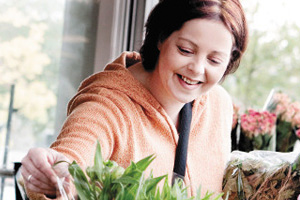Ihr Warenkorb
Erfahrungsberichte
Ein Stoma, ob temporär oder permanent, stellt eine große Veränderung im Leben dar. Einige Personen können viel Zeit und Gewöhnung brauchen, um das Leben mit einem Stoma zu akzeptieren. andere stellen sich schneller darauf ein. Wie Sie mit dem Stoma umgehen können, hängt von Ihnen und Ihrer Situation ab – es gibt keine richtige oder falsche Art, mit einem Stoma zu leben. Wir haben die Geschichten einiger Menschen gesammelt, die mit einem Stoma leben und ihre Erfahrungen teilen.
Ako
Ileostomy since 2002
Country: Japan
Occupation: Speaker
Leisure time: Presenter for Japanese Stoma Association
It is important to get as much information as possible
I have suffered from Crohn's disease for the last 20 years and have been treated with medicine, but 8 years ago I had an acute operation because of a perforation in my large intestine. Before the surgery, I did not get enough information about having a stoma, so I tell others to get as much information as possible when they know that their diagnosis may result in a stoma. It is important to get the right information from both the surgeon and stoma care nurse, as well as from people who live with a stoma, to be able to prepare for it in the best way. Search for information on the Internet and in books to minimise the fear of the unknown.
I have accepted my stoma from the beginning
Learning to take care of my stoma was not a problem, and I have accepted it from the beginning, because I knew that it was a matter of life or death if I did not have it. My stoma is situated in the right spot. which is very important for daily care but also for my quality of life. My husband has always been very supportive, and he has accepted my stoma too. I am very open about having a stoma, but I do not tell everyone about it, because I have noticed that some people find it awkward. Of course my family and nearest friends know, and for them it is not an issue.
Talking to other people with a stoma is very helpful
To create more awareness about people living with a stoma, I travel around Japan for the Stoma Association and give presentations. Something that helped me a lot after having my stoma was talking to other people in the same situation, and if I can do the same for others, I gladly do so. I think it is important to get information from other people living with a stoma because we have experienced some of the same things.
Leakage is the biggest fear
I think that leakage and the smell of stool are the biggest fears that a person with a stoma experiences. I have had a leakage only once, but I can still clearly remember it, and it led me to change some habits in my daily life. When I am out, I always start by checking the toilet facilities, e.g., in restaurants and when visiting new places, and I always sit near an emergency exit if possible.
Different traditions
In Japan there are some traditions that aren't practised in the rest of the world, and one of them is taking very hot baths. It is possible to do this while wearing a pouch, but it is not the best for the skin barrier. My solution is to use waterproof tape around the edges, and then I don't stay in the hot water as long as I normally would. It works for me and I can enjoy my bath.
Another thing that is special in Japan—and only for women with a stoma—is our traditional kimono. A traditional kimono is very tight around the stomach, and one can be very difficult to wear with a stoma. I had mine tailor-made, with enough space so my stoma wouldn't get trapped. No one can see the difference, and I feel comfortable wearing my favourite outfit.
I would like to tell other people with a stoma—or people that are going to have one—that it is important to live the life you have always lived, get as much information as possible, and talk to other people who have a stoma.







